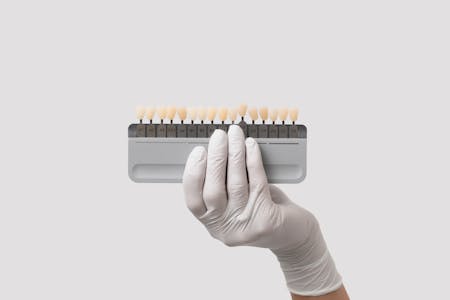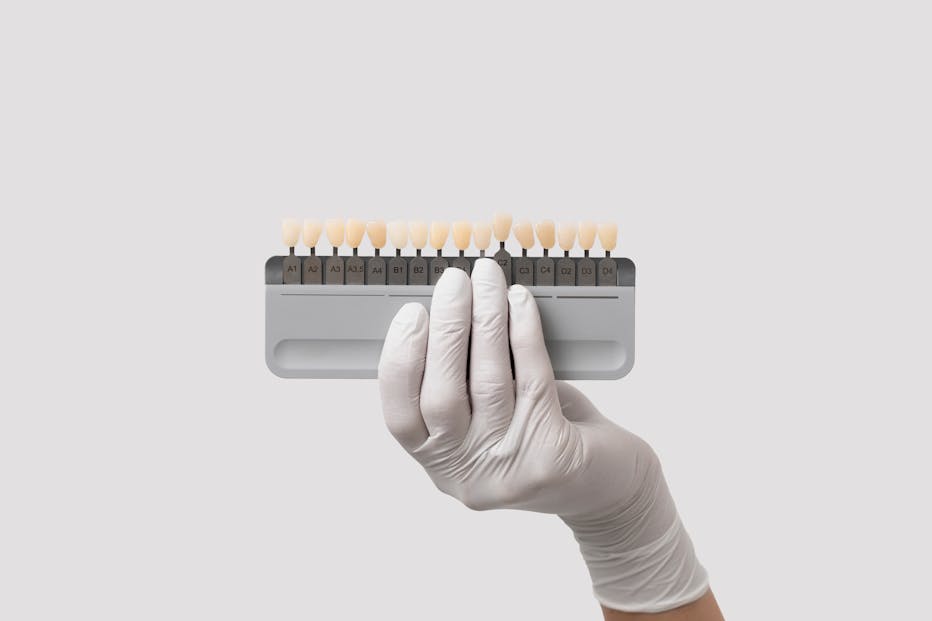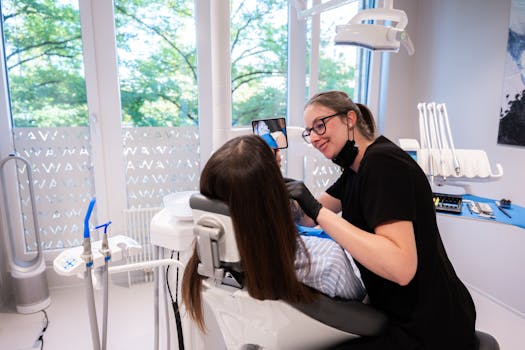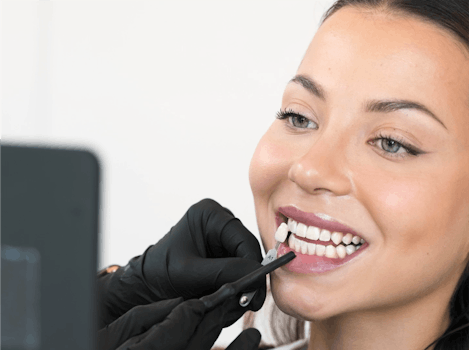The truth about tooth discolouration and bleaching options
Tooth discolouration is a common aesthetic problem that affects people of all ages. While there are many causes of discoloured teeth, teeth whitening offers an effective way to brighten smiles and boost self-confidence. In this article, we look at the most common causes of tooth discolouration and the effectiveness of teeth whitening, based on current statistics and research.



The most common causes of tooth discolouration
Tooth discolouration can be caused by a variety of factors, including both internal and external influences. According to a study by the American Dental Association (ADA), there are several main causes that lead to discoloured teeth:
Food and beverages
One of the most common causes of tooth discolouration is certain foods and drinks. Coffee, tea, red wine and dark fruits such as berries contain chromogens, substances that can attach to tooth enamel and discolour it. According to a survey conducted by Statista in 2023, 85% of respondents stated that they consume coffee or tea, which leads to significant exposure to these discolouring substances.
Tobacco consumption
Smoking and chewing tobacco are other major causes of tooth discolouration. The tar and nicotine components in tobacco leave yellowish or brown stains on the teeth. A study by the World Health Organisation (WHO) shows that smokers have a three times higher risk of tooth discolouration than non-smokers.
Medication
Certain medications, such as tetracycline antibiotics, can lead to permanent discolouration, especially if taken at a young age. A Mayo Clinic study indicates that about 10% of people who took tetracyclines in childhood suffer from visible tooth discolouration.
Age
As we age, tooth enamel naturally deteriorates, making the underlying yellowish dentin more visible. According to a 2022 Journal of Dentistry study, the prevalence of tooth discolouration increases by around 25% in people over the age of 50.
Genetics
Some people are genetically predisposed to thinner or less resistant enamel, which makes them more susceptible to discolouration. According to a study by Nature, a genetic predisposition can explain around 15% of cases of tooth discolouration.
The effectiveness of tooth bleaching
Tooth bleaching is one of the most effective methods of treating tooth discolouration. However, the effectiveness depends on the type and cause of the discolouration as well as the bleaching method used. Here are some key statistics and findings on the effectiveness of tooth bleaching:
Professional bleaching
According to a study by the American Academy of Cosmetic Dentistry (AACD), 95% of patients who undergo professional teeth whitening achieve visible results after just one session. Bleaching is particularly effective for extrinsic discolouration caused by food, drink and tobacco.
Home bleaching kits
Home bleaching kits used under the supervision of a dentist also show good results. A study by PubMed from 2023 shows that 80% of users notice an improvement of several colour levels after two weeks.
Long-term effectiveness
A study in the Journal of Esthetic and Restorative Dentistry from 2022 shows that the results of professional bleaching can last up to three years with proper care (e.g. avoiding discolouring substances). Regular refresher treatments can further extend these results.
Peroxides versus peroxide-free products
The effectiveness of peroxide-free bleaching products has also gained attention in recent years. According to a study by Harvard Health, these products can lighten mild to moderate discolouration by 1-2 shades, making them a popular alternative for people with sensitive teeth. Our ALPINE WHITE products also contain no peroxides.
Patient satisfaction
According to a survey conducted by Statista in 2023, 87% of respondents who have used teeth whitening are satisfied with the results and would recommend the treatment to others.


Gently achieve whiter teeth with our pain-free in-office bleaching. Carried out by our specialised dental staff.
- Naturally white teeth
- Effective tooth whitening without peroxides
- No change in the tooth structure
How tooth whitening can help
Tooth whitening can significantly lighten most types of discolouration, especially if the discolouration is extrinsic in nature. Here are some specific benefits:
Aesthetics and self-confidence
A brighter smile is often associated with health and youthfulness. Many people report feeling more confident after a teeth whitening treatment. A bright smile can have a positive impact on personal and professional life by enhancing appearance and charisma.
Fast results
While natural methods of teeth whitening can take weeks or months, professional bleaching delivers fast results within a few hours. Teeth whitening therefore offers a prompt solution for those who want to improve their smile quickly.
Customisable
Teeth whitening can be customised to the client's needs, depending on the desired level of whitening and the sensitivity of the teeth. ALPINE WHITE bleaching is a particularly gentle method that does not use peroxides. This means that whitening has been specially developed for those who have sensitive teeth or want to avoid the potential side effects of peroxide-based products. Although it is gentler, it still achieves visible results that can be customised to your individual needs.
With ALPINE WHITE, you can be sure that your smile will not only be brighter, but also cared for in a healthy and gentle way. Our treatment is an ideal choice for anyone who values natural and long-lasting results.
Preventive measures and long-term care after bleaching
While teeth whitening is an effective way to remove discolouration and whiten teeth, it is equally important to take preventative measures and provide consistent care after treatment to maintain long-term results. According to a study by the American Dental Association (ADA), teeth that are not properly cared for after bleaching lose up to 50% of their brightness within six months.
Prevention and care
One of the most important preventative measures is to reduce the consumption of discolouring foods and drinks such as coffee, tea, red wine and cola. The use of a drinking straw can help to minimise contact between these liquids and the teeth. It is also advisable to brush and floss your teeth at least twice a day to prevent plaque and discolouration.
Refresher treatments and the role of ALPINE WHITE
Many dentists and dental experts recommend regular refresher treatments to maintain the brightness of teeth. These can be carried out every six months to two years, depending on individual needs and habits. A study in the Journal of Clinical Dentistry shows that booster treatments can extend the effectiveness of the original bleaching by up to five years.
Use of ALPINE WHITE Whitening Toothpastes
After whitening, it is particularly important to use mild toothpastes that have been specially developed for sensitive teeth. ALPINE WHITE offers whitening toothpastes that are perfectly tailored to the needs of lighter-coloured teeth. These toothpastes not only help to protect the enamel, but also to maintain the whitening results achieved for longer. They contain gentle ingredients that prevent further discolouration and strengthen the teeth at the same time.
By combining our peroxide-free bleaching with the regular use of our whitening toothpastes, you can ensure that your radiant smile is maintained in the long term. Using these products reduces the need for frequent touch-ups and helps to promote overall dental health. With ALPINE WHITE, you have the opportunity to maintain a bright, healthy smile in a natural and gentle way.
Conclusion
Tooth discolouration is a common problem that can be caused by a variety of factors, from diet and lifestyle habits to age and genetics. Tooth whitening offers an effective solution to treat these discolourations and restore a radiant smile. Statistics show that tooth whitening is successful for most people and can lead to a significant improvement in appearance.


